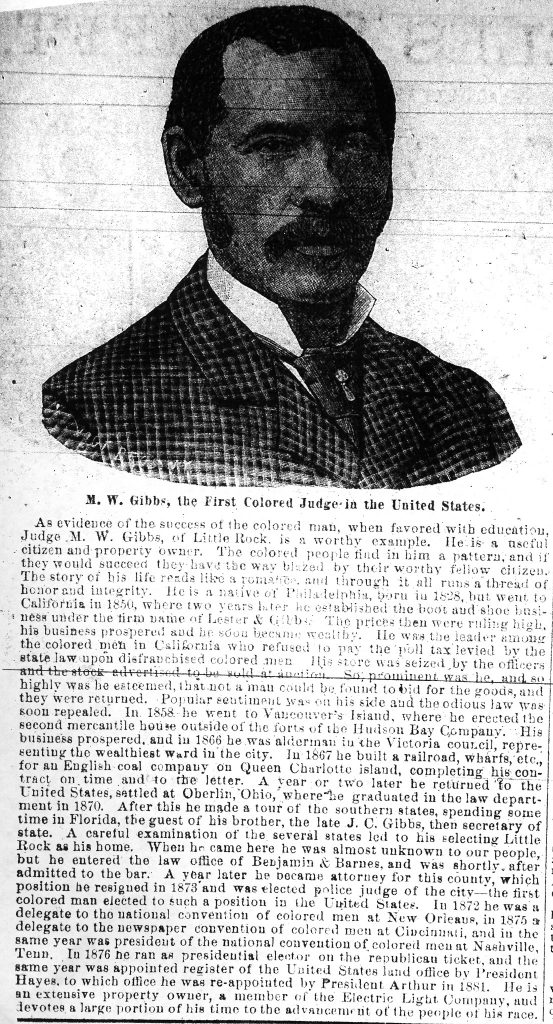M.W. Gibbs, the First Colored Judge in the United States

This article describes Mifflin Gibbs’s contributions to Little Rock and Arkansas, and his biography up to 1885.
Excerpts
As evidence of the success of the colored man, when favored with education, Judge M.W. Gibbs, of Little Rock, is a worthy example. He is a useful citizen and property owner. The colored people find in him a pattern, and if they would succeed they have the way blazed by their worthy fellow citizen. The story of his life reads like a romance, and through it all runs a thread of honor and integrity. He is a native of Philadelphia, born in 1823, but went to California in 1850, where two years later he established the boot and shoe business under the firm name of Lester & Gibbs. The prices then were ruling high. His business prospered and he soon became wealthy. He was the leader among the colored men in California who refused to pay the poll tax levied by the state law upon disfranchised colored men. His store was seized by the officers and the stock advertised to be sold at auction. So prominent was he, and so highly was he esteemed, that not a man could be found to bid for the goods, and they were returned. Popular sentiment was on his side and the odious law was soon repealed. In 1858 he went to Vancouver’s Island, where he erected the second mercantile house outside the forts of the Hudson Bay Company. His business prospered, and in 1866 he was alderman in the Victoria council, representing the wealthiest ward in the city. In 1867 he built a railroad, wharfs, etc., for an English coal company on Queen Charlotte island, completing his contract on time and to the letter. A year or two later he returned to the United States, settled at Oberlin, Ohio, where he graduated in the law department in 1870. After this he made a tour of the southern states, spending some time in Florida, the guest of his brother, the late J.C. Gibbs, then secretary of state. A careful examination of the several states led to his selecting Little Rock as his home. When he came here he was almost unknown to our people, but he entered the law office of Benjamin & Barnes, and was shortly after admitted to the bar. A year later he became attorney for this county, which position he resigned in 1873 and was elected police judge of the city–the first colored man elected to such a position in the United States. In 1872 he was a delegate to the national convention of colored men at New Orleans, in 1875 a delegate to the newspaper convention of colored men at Cincinnati, and in the same year was president of the national convention of colored men at Nashville, Tenn. In 1876 he ran as presidential elector on the republican ticket, and the same year was appointed register of the United States land office by President Hayes, to which office he was re-appointed by President Arthur in 1881. He is an extensive property owner, a member of the Electric Light Company, and devotes a large portion of his time to the advancement of the people of his race.
Questions:
Where did Mr. Gibbs travel and live? Why?
What businesses and jobs did he have?
How did Mifflin Gibbs contribute to politics and economics in Arkansas and the United States?
What does the author of this newspaper article think of Mr. Gibbs?
What questions do you have after reading this article?
Citations
“M.W. Gibbs, the first Colored Judge in the United States” Arkansas Gazette, May 29, 1885.